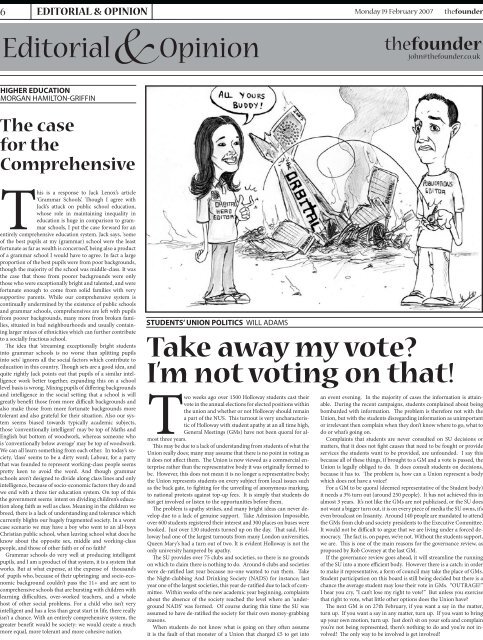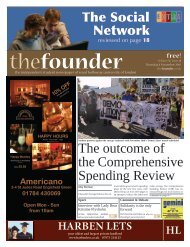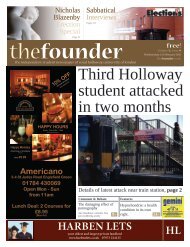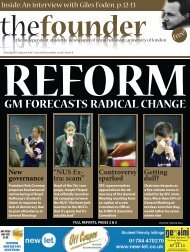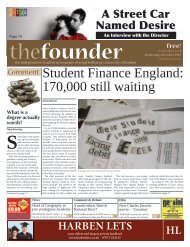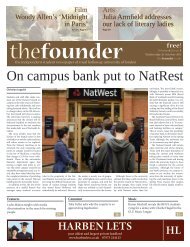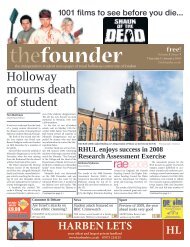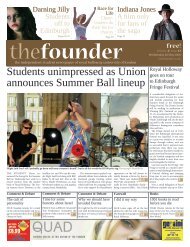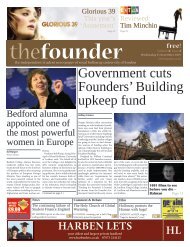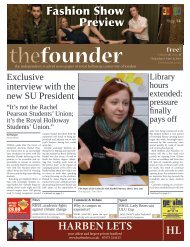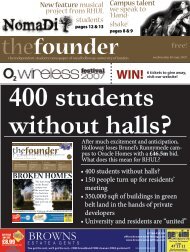NEWS - The Founder
NEWS - The Founder
NEWS - The Founder
You also want an ePaper? Increase the reach of your titles
YUMPU automatically turns print PDFs into web optimized ePapers that Google loves.
EDITORIAL & OPINION Monday 19 February 2007 thefounder<br />
& Opinion<br />
thefounder<br />
john@thefounder.co.uk<br />
Editorial<br />
HIGHER EDUCATION<br />
MORGAN HAMILTON-GRIFFIN<br />
he case<br />
or the<br />
omprehensive<br />
his is a response to Jack Lenox’s article<br />
‘Grammar Schools’. Though I agree with<br />
Jack’s attack on public school education,<br />
whose role in maintaining inequality in<br />
education is huge in comparison to grammar<br />
schools, I put the case forward for an<br />
ntirely comprehensive education system. Jack says, ‘some<br />
f the best pupils at my (grammar) school were the least<br />
ortunate as far as wealth is concerned’, being also a product<br />
f a grammar school I would have to agree. In fact a large<br />
roportion of the best pupils were from poor backgrounds,<br />
hough the majority of the school was middle-class. It was<br />
he case that those from poorer backgrounds were only<br />
hose who were exceptionally bright and talented, and were<br />
ortunate enough to come from solid families with very<br />
upportive parents. While our comprehensive system is<br />
ontinually undermined by the existence of public schools<br />
nd grammar schools, comprehensives are left with pupils<br />
rom poorer backgrounds, many more from broken famiies,<br />
situated in bad neighbourhoods and usually containng<br />
larger mixes of ethnicities which can further contribute<br />
o a socially fractious school.<br />
<strong>The</strong> idea that ‘streaming exceptionally bright students<br />
nto grammar schools is no worse than splitting pupils<br />
nto sets’ ignores all the social factors which contribute to<br />
ducation in this country. Though sets are a good idea, and<br />
uite rightly Jack points out that pupils of a similar inteligence<br />
work better together, expanding this on a school<br />
evel basis is wrong. Mixing pupils of differing backgrounds<br />
nd intelligence in the social setting that a school is will<br />
reatly benefit those from more difficult backgrounds and<br />
lso make those from more fortunate backgrounds more<br />
olerant and also grateful for their situation. Also our sysem<br />
seems biased towards typically academic subjects,<br />
hose ‘conventionally intelligent’ may be top of Maths and<br />
nglish but bottom of woodwork, whereas someone who<br />
s ‘conventionally below average’ may be top of woodwork.<br />
e can all learn something from each other. In today’s soiety,<br />
‘class’ seems to be a dirty word; Labour, for a party<br />
hat was founded to represent working-class people seems<br />
retty keen to avoid the word. And though grammar<br />
chools aren’t designed to divide along class lines and only<br />
ntelligence, because of socio-economic factors they do and<br />
e end with a three tier education system. On top of this<br />
he government seems intent on dividing children’s educaion<br />
along faith as well as class. Meaning in the children we<br />
reed, there is a lack of understanding and tolerance which<br />
urrently blights our hugely fragmented society. In a worst<br />
ase scenario we may have a boy who went to an all-boys<br />
hristian public school, when leaving school what does he<br />
now about the opposite sex, middle and working-class<br />
eople, and those of other faith or of no faith?<br />
Grammar schools do very well at producing intelligent<br />
upils, and I am a product of that system, it is a system that<br />
orks. But at what expense, at the expense of thousands<br />
f pupils who, because of their upbringing and socio-ecoomic<br />
background couldn’t pass the 11+ and are sent to<br />
omprehensive schools that are bursting with children with<br />
earning difficulties, over-worked teachers, and a whole<br />
ost of other social problems. For a child who isn’t very<br />
ntelligent and has a less than great start in life, there really<br />
sn’t a chance. With an entirely comprehensive system, the<br />
reater benefit would be society: we would create a much<br />
ore equal, more tolerant and more cohesive nation.<br />
STUDENTS’ UNION POLITICS WILL ADAMS<br />
Take away my vote?<br />
I’m not voting on that!<br />
Two weeks ago over 1500 Holloway students cast their<br />
vote in the annual elections for elected positions within<br />
the union and whether or not Holloway should remain<br />
a part of the NUS. This turnout is very uncharacteristic<br />
of Holloway with student apathy at an all time high,<br />
General Meetings (GMs) have not been quoral for almost<br />
three years.<br />
This may be due to a lack of understanding from students of what the<br />
Union really does; many may assume that there is no point in voting as<br />
it does not affect them. <strong>The</strong> Union is now viewed as a commercial enterprise<br />
rather than the representative body it was originally formed to<br />
be. However, this does not mean it is no longer a representative body;<br />
the Union represents students on every subject from local issues such<br />
as the back gate, to fighting for the unveiling of anonymous marking,<br />
to national protests against top-up fees. It is simply that students do<br />
not get involved or listen to the opportunities before them.<br />
<strong>The</strong> problem is apathy strikes, and many bright ideas can never develop<br />
due to a lack of genuine support. Take Admission Impossible,<br />
over 600 students registered their interest and 300 places on buses were<br />
booked. Just over 130 students turned up on the day. That said, Holloway<br />
had one of the largest turnouts from many London universities,<br />
Queen Mary’s had a turn out of two. It is evident Holloway is not the<br />
only university hampered by apathy.<br />
<strong>The</strong> SU provides over 75 clubs and societies, so there is no grounds<br />
on which to claim there is nothing to do. Around 6 clubs and societies<br />
were de-ratified last year because no-one wanted to run them. Take<br />
the Night-clubbing And Drinking Society (NADS) for instance; last<br />
year one of the largest societies, this year de-ratified due to lack of committee.<br />
Within weeks of the new academic year beginning, complaints<br />
about the absence of the society reached the level where an ‘underground<br />
NADS’ was formed. Of course during this time the SU was<br />
assumed to have de-ratified the society for their own money-grabbing<br />
reasons.<br />
When students do not know what is going on they often assume<br />
it is the fault of that monster of a Union that charged £5 to get into<br />
an event evening. In the majority of cases the information is attainable.<br />
During the recent campaigns, students complained about being<br />
bombarded with information. <strong>The</strong> problem is therefore not with the<br />
Union, but with the students disregarding information as unimportant<br />
or irrelevant then complain when they don’t know where to go, what to<br />
do or what’s going on.<br />
Complaints that students are never consulted on SU decisions or<br />
matters, that it does not fight causes that need to be fought or provide<br />
services the students want to be provided, are unfounded. I say this<br />
because all of these things, if brought to a GM and a vote is passed, the<br />
Union is legally obliged to do. It does consult students on decisions,<br />
because it has to. <strong>The</strong> problem is, how can a Union represent a body<br />
which does not have a voice?<br />
For a GM to be quoral (deemed representative of the Student body)<br />
it needs a 3% turn out (around 250 people). It has not achieved this in<br />
almost 3 years. It’s not like the GMs are not publicised, or the SU does<br />
not want a bigger turn out, it is on every piece of media the SU owns, it’s<br />
even broadcast on Insanity. Around 140 people are mandated to attend<br />
the GMs from club and society presidents to the Executive Committee.<br />
It would not be difficult to argue that we are living under a forced democracy.<br />
<strong>The</strong> fact is, on paper, we’re not. Without the students support,<br />
we are. This is one of the main reasons for the governance review, as<br />
proposed by Rob Coveney at the last GM.<br />
If the governance review goes ahead, it will streamline the running<br />
of the SU into a more efficient body. However there is a catch: in order<br />
to make it representative, a form of council may take the place of GMs.<br />
Student participation on this board is still being decided but there is a<br />
chance the average student may lose their vote in GMs. “OUTRAGE!”<br />
I hear you cry, “I can’t lose my right to vote!” But unless you exercise<br />
that right to vote, what little other options does the Union have?<br />
<strong>The</strong> next GM is on 27th February, if you want a say in the matter,<br />
turn up. If you want a say in any matter, turn up. If you want to bring<br />
up your own motion, turn up. Just don’t sit on your sofa and complain<br />
you’re not being represented, there’s nothing to do and you’re not involved!<br />
<strong>The</strong> only way to be involved is get involved!


